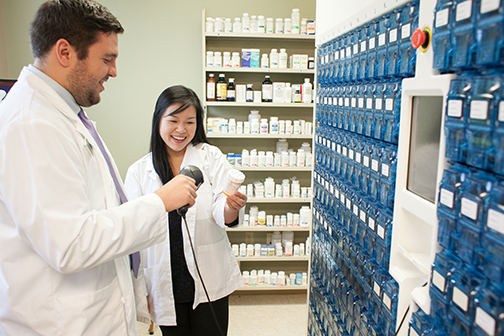The Pharmacy program encompasses both the basic and clinical sciences and is designed to provide students with the knowledge, skills, and attitudes essential to the practice of pharmacy. Pharmacists work in concert with the patient and other health care providers to promote health and prevent diseases. This is achieved by assessing, monitoring, initiating and modifying patients' medication therapy to achieve optimal therapeutic outcomes.
Selective Admission
To enroll as a freshman in the College of Health Professions (pre-pharmacy), you should have taken the ACT or SAT and have graduated from high school with a minimum of 17 academic units, at least four units of English and three units of mathematics. You should complete course work in physical and biological sciences. Upon successfully being accepted to NDSU, transfer students may be admitted to the College of Health Professions and declare a pre-professional major at any time, so long as they are in good academic and professional standing.
Admission to the professional pharmacy program is competitive and limited to 85 students each year. Students are selected based upon successful prior academic performance at the time of admission. There are two paths to gain admission into the pharmacy program.
The first is our “early admission” path. This path is designed for high achieving high school students who seek an expedited path to the professional program. Students are selected for this path based on their academic credentials (including high school grade point averages and ACT or SAT scores) at the time they apply to NDSU. Preference is given to North Dakota residents. Students are evaluated during the summer before they enroll at NDSU as first year students, and will be offered admission to this path on or before July 15 of that year. Once accepted on this admission path, students must attend NDSU for the entire six-year program. The first year entails standard pre-professional studies. At the conclusion of the first year, students who maintain academic and professional requirements transition into a five-year professional program. During the first year in the professional program, students complete all remaining pre-professional requirements, including an expedited set of courses that prepare them for the final four years of the professional program. Students also complete the Pharmacy College Admissions Test (PCAT) and an on-site interview. Transition into the final four years of the professional program is guaranteed as long as students meet all academic and professional requirements. Students accepted into the “early admissions” path, but who fail to meet all academic and professional requirements, are encouraged to apply to the professional program through the second path described below.
The second path is our “traditional” path. Prepharmacy students (including transfer students) typically apply for admission to the four-year professional program during the second (or in some cases the third) pre-pharmacy year. Admission to the professional pharmacy program is competitive and limited to the difference between the number of available seats (85) and the number of “early admission” students entering the final four years of the professional program each year. Students are selected based upon successful pre-pharmacy academic performance. Preference is given to North Dakota residents and students who attend NDSU. A cumulative grade point average of 3.0 (4.0 = A) or above is required before an applicant will be evaluated for admission to the professional program. The actual admission cutoff is much higher. The Pharmacy College Admission Test (PCAT) is an admission requirement. Students must take the PCAT during the July or September testing dates. An on-site interview is part of the admission process for the professional program. Supplemental applications are due on or before December 31 for subsequent fall semester admission. Supplemental applications are submitted online directly to the Pharmacy Admissions Committee. A nonrefundable $100.00 application fee must accompany the supplemental application.
Differential Tuition
Students in the pharmacy professional program (i.e., the final five years of study for students on the “early admissions” path, and the final four years for students on the “traditional” admissions path) are assessed a different tuition rate. This differential tuition is assessed to cover the higher costs associated with the program.
Current Curriculum
The curriculum leading to the Pharm.D. degree requires a minimum of six years of study. Approximately 77 semester hours are required in the pre-professional curriculum. The vast majority of required pre-professional courses (listed by name and number) must be completed by the end of spring term prior to admission to the professional program (for “traditional” path students), or for “early admissions” students, the final four years of the professional program. A maximum of six elective credits may be taken during the summer prior to entrance in the professional program.
The current entry-level Pharm.D. curriculum is designed to produce graduates with the professional competencies necessary to enter pharmacy practice in any setting to ensure optimal medication therapy outcomes and patient safety, and to satisfy the educational requirements for licensure as a pharmacist. The Pharm.D. degree prepares the student to accept positions in community, hospital, managed care, clinical, and industrial pharmacy. Other potential opportunities include administrative positions in pharmaceutical companies and associations. Teaching and research positions in universities and the pharmaceutical industry are excellent opportunities for those with advanced training in pharmacy.
The college is a member of the American Association of Colleges of Pharmacy, and is accredited by the Accreditation Council for Pharmacy Education (ACPE).
IMPORTANT DISCLAIMER: This guide is not an official curriculum. This guide is a sample four-year degree plan of how students might plan this major with other degree requirements to complete their education in four years.Student plans will vary from this sample due to a variety of factors, such as, but not limited to, start year, education goals, transfer credit, and course availability. To ensure proper degree completion, enrolled students should utilize Degree Map and Schedule Planner in Campus Connection and consult regularly with academic advisors to ensure graduation requirements are being met.
PRE-PHARMACY PROGRAM REQUIREMENTS

